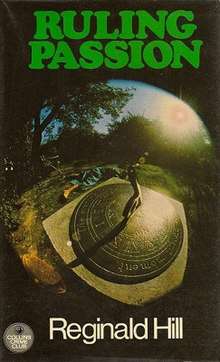Ruling Passion
Ruling Passion is a 1973 crime novel by Reginald Hill, the third novel in the Dalziel and Pascoe series. The novel opens with Detective Peter Pascoe arriving at what should have been a reunion of old friends. Instead he walks in on the scene of a grisly triple-murder. To solve the crime, Pascoe needs both his superior officer, Andy Dalziel and his romantic partner—and Dalziel's feminist antagonist—Elli.[1]
 First edition | |
| Author | Reginald Hill |
|---|---|
| Country | United Kingdom |
| Language | English |
| Series | Dalziel and Pascoe series, #3 |
| Genre | crime novel |
| Publisher | Collins Crime Club |
Publication date | April 1973 |
| Media type | Print (Hardcover) |
| Pages | 255p. |
| ISBN | 0-00-231710-9 |
| OCLC | 746618 |
| 823/.9/14 | |
| LC Class | PZ4.H64856 Ru PR6058.I448 |
| Preceded by | An Advancement of Learning |
| Followed by | An April Shroud |
Publication history
- 1973, London: Collins Crime Club ISBN 0-00-231710-9, Pub date April 1973, Hardback
- 1987, London: Harper Collins ISBN 0-586-07260-8[2]
- 2008, New York: Felony & Mayhem Press ISBN 978-1-934609-17-0, Pub date September 2008.
gollark: Then someone removed the link because of inactivity or something.
gollark: Previous policy was to link both and an explanation.
gollark: Logos just banned baidicoot for posting https://discord.gg/bUJsVqRen4 after it was asked for.
gollark: Exciting news: GTech™ bee invocation is now 0.002% more efficient.
gollark: I... do not think it would make sense to just isolate all available information on palaiologos from my perception of palaiologos.
References
This article is issued from Wikipedia. The text is licensed under Creative Commons - Attribution - Sharealike. Additional terms may apply for the media files.